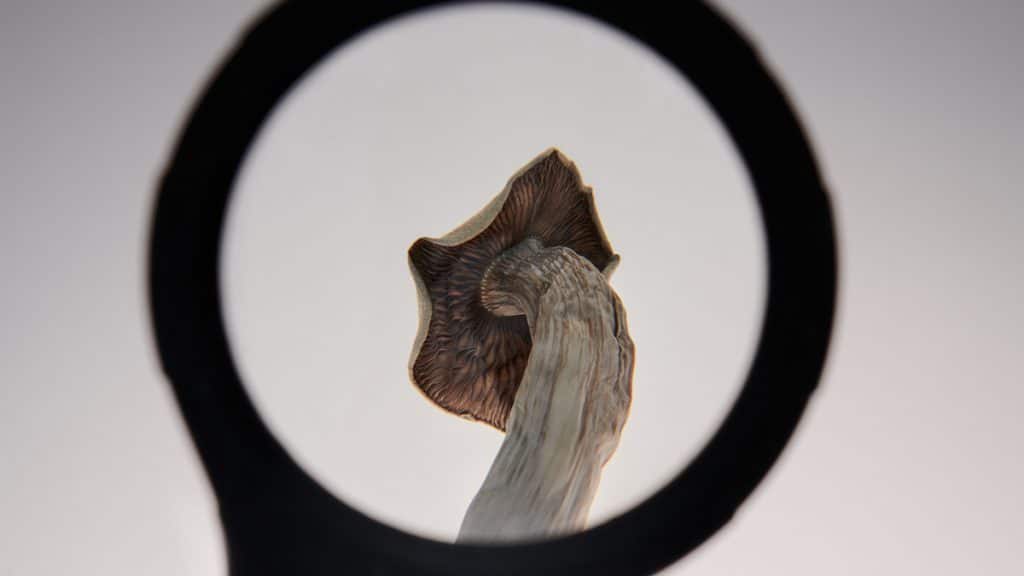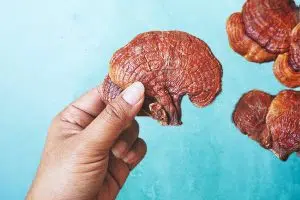This is a sponsored article in partnership with Gwella Mushrooms.
For years to come, people will talk about how they survived the grueling periods of isolation and boredom brought to us by the COVID-19 pandemic. For many Americans and Canadians, the answer to that question is microdosing psychedelics.
A recent report from Gwella Mushrooms—a Canadian company that specializes in alternative mushroom-based wellness and increased psychedelic awareness—found that an overwhelming 91 percent of the 1000 respondents across North America began or continued microdosing over the past two years due to COVID-19. Nearly 50 percent of the 2022 Gwella Microdosing Survey respondents said that they began microdosing because of the pandemic, and another 41 percent said they microdosed more often due to the COVID-19 pandemic.
Microdosing means consuming sub-hallucinogenic amounts of psychedelics. For the survey, Gwella defined microdosing as consuming anywhere between 50 and 200mg of magic mushrooms or a similar substance. That amount is much less than the 1-3 grams of mushrooms usually required to experience psilocybin’s trippy effects, but respondents to Gwella’s research say that the small dose lets them enjoy the physical, psychological, and spiritual benefits of psychedelics while still being able to function normally, if not better, throughout the day.
Gwella co-founder Peter Reitano says he thinks that one reason so many people experimented with microdosing during the pandemic was that they had more time to explore new interests. “The pandemic put people in positions to try new things–from breadmaking, to biking, to microdosing,” he says.

He added that people seem to be more open to microdosing psychedelics thanks to the liberalization of drug laws in America and Canada, which have contributed to and reflect greater mainstream acceptance of these compounds. “With less stigma toward psychedelics, people want to get involved with and be a part of the waves of people experimenting with alternative health options,” Reitano says.
Given the extreme psychological strain that the pandemic brought on, it’s not surprising that more people have been turning to psychedelics as a solution. Studies from institutions like Johns Hopkins and Imperial College London have shown that psychedelic compounds like psilocybin could help treat mental health conditions such as anxiety, depression, and substance use disorders. The popularity of microdosing is likely to increase in the meantime as people slowly recover from the chronic stress of dealing with the pandemic.
How to Grow Shrooms Bundle
Take Both of Our Courses and Save $90!
Read: COVID-19 Isn’t Just a Medical Crisis—It’s an Existential One
“I think we all experienced a kind of collective trauma with the pandemic, with varying degrees of stress, anxiety, and loss depending on our personal situations,” Reitano shares. “It was scary. None of us has been through something like this before. We worried about our health, our economic lives. We got separated from our families, friends, and communities. We all dealt with an enormous amount of unknowns. I think we’ll be dealing with the mental health fallout of this for a while.”
Mental health experts agree with Reitano’s assessment. “There has been an epidemic of chronic stress that’s been going on for a long time, and people are feeling so much uncertainty, that we’re concerned now it will take a lot of time for them to get over this experience,” Margaret Eaton, CEO of the Canadian Mental Health Association, told CBC.
This mental health crisis isn’t only happening in Canada. “The information we have now about the impact of COVID-19 on the world’s mental health is just the tip of the iceberg,” Dr. Tedros Adhanom Ghebreyesus, director-general of WHO, told CBC. “This is a wake-up call to all countries to pay more attention to mental health and do a better job of supporting their populations’ mental health.”
Providing that support could involve supporting ongoing research in microdosing psychedelics like LSD, which has shown promise as a potential treatment for anxiety.
Microdosing and Work Culture
Aside from dealing with the pandemic, many respondents said that they microdose to improve their work life. Nearly nine out of ten respondents (86 percent) attributed microdosing to better professional performance. That’s because taking sub-hallucinogenic amounts of psilocybin helps decrease stress, according to 71 percent of respondents. And 44 percent added that microdosing improved their professional relationships, which isn’t surprising since recent studies suggest that psilocybin could foster empathy.
“Wearing someone else’s shoes, feeling close to someone else’s experience, we react differently towards them”, Reitano notes. “When someone microdoses, they might have access to a deeper understanding of what another person is going through.”
Of course, some people might be alarmed by the idea that the coworker in the next cubicle is microdosing before heading to the office, but Reitano doesn’t see taking miniscule amounts of psilocybin and other psychedelics as any different than having a beer over lunch. “It all comes down to individual tolerances. A drink at lunch is the norm in a lot of work cultures, but come in drunk and unable to do your job? Unacceptable. Microdose for better performance? Cool. Eat a gram of shrooms at lunch and come in tripping? Unacceptable. So, focus on what gets the best out of your employees—what’s their output?”

Noting the survey respondents’ strong belief that microdosing can benefit the workforce, Gwella predicts that 2022 will see shared psychedelic experiences become an alternative to traditional corporate bonding.
“Anecdotally, I’ve heard from a lot of people (granted, more in startups and progressive environments) that work retreats now involve things like psychedelics and psychedelic-adjacent experiences, like breathwork,” Reitano says. “There are companies like Greenlight Psychedelics that help integrate these experiences into corporate settings. And there are organizations like 1heart that invite change-makers to immerse themselves in these medicines and each other for intense growth.”
Reitano believes that life could be a bit better for everyone if more corporations embraced these psychedelic retreats. “It’s a cliché, but imagine a world where policymakers and leaders sat at a psychedelic retreat together. It’s a way forward as we build a more harmonious world.”
Read: Long Term Effects of Microdosing
As the push to legalize psychedelics gains momentum across America, more people will unwind after work with psilocybin instead of scotch, Gwella predicts.
“Historically [unwinding] has been with tobacco or alcohol. But now cannabis is becoming a regular replacement, and microdoses are becoming more popular,” Reitano says. “As people learn the beauty these small doses offer without a hangover, there’s no reason small doses of psychedelics won’t replace the adverse toxins we’re accustomed to unwinding with.”
Many who are already using psychedelics to unwind think that their employers should pick up part of the tab. According to Gwella’s report, 92 percent of respondents want their work benefits to cover microdosing. That might sound far-fetched, but Reitano doesn’t think so. “It’ll happen. You can get cannabis on work benefits in Canada. I think psychedelic therapy will soon follow.” And even in the United States, Dr. Bronner’s Magic Soaps has partnered with the nonprofit healthcare provider Enthea, to offer employees ketamine-assisted therapy.
Normalizing Microdosing
The report from Gwella also suggests that microdosing psychedelics is becoming part of everyday life for many people. Over two-thirds of respondents (68 percent) revealed that they microdose alongside daily staples like coffee or tea.
“I think what this says is that the practice is normalized—more integrated into day-to-day routines and consumption,” Reitano says, adding that psychedelics like psilocybin are increasingly being “used like a health and wellness tool rather than a recreational drug.”
Researchers have also noticed a significant shift in attitudes toward microdosing psychedelics. “In the past, people were using microdosing for performance enhancement and creativity,” Adam Winstock, an honorary clinical professor at University College London’s Institute of Epidemiology and Health Care, told The Guardian. “Now I think people are shifting towards using microdosing to enhance wellbeing and to address mental health distress.”
People are also getting more comfortable with discussing their psychedelic use. Over half of the respondents (61 percent) to Gwella’s microdosing survey say their colleagues know that they microdose and 64 percent feel comfortable with recommending microdosing to coworkers.

“I think this is a really good thing because talking about drugs is toughest at work and with family or friends,” Reitano says. “Normalization means talking about it publicly, and the fact that over half the people we polled were comfortable enough to share their psychedelic relationship means the tides are turning in favor of these tools.”
How to Grow Shrooms Bundle
Take Both of Our Courses and Save $90!
He added that the 36 percent of respondents who don’t want to discuss psychedelics with coworkers might have to get used to opening up about microdosing as their colleagues start to wonder how they manage to remain calm under pressure. “When people feel better, they look better and radiate differently. Think back to a time when you saw someone who looked happier, healthier, lighter. When you’ve known a person to be one way, and then they start showing a more mature, balanced side of themselves, people will ask what helped them turn a new leaf. Enter: microdosing.”
A Flash in the Pan(demic)?
The increased popularity of microdosing during the pandemic is a major win for advocates, reformers, and anyone else who’s fighting to change people’s minds about psychedelics. But skeptics wonder if this trend will subside along with COVID-19.
“I think microdosing is here to stay,” Reitano says. “The pandemic was a catalyzing force for many things, microdosing included, but the trend was already there. I don’t think we’ll see a rollback. I think we’ll see continuing interest and exploration, especially as destigmatization and cultural normalization continue. People have been leveraging these ancient tools for as long as recorded history, and now the 21st century is starting to see the benefits that psychedelics provide.”
The rising popularity of microdosing might also make some wonder if “normal” dosing will fall by the wayside in years to come, but Reitano doesn’t see that happening either. “Let’s be honest, there is nothing like a true psychedelic experience, whether that’s one or two grams of shrooms or one hit of 5-MeO-DMT. I think if you’re interested in trying psychedelics and don’t have a full experience, you’re missing out.”
To help people find out what they’ve been missing, Gwella is dedicated to fighting unjust drug laws that prevent people from experimenting with psilocybin and other plant-based wellness products. “We hope in our lifetime to see total acceptance of these substances (i.e., no legal barriers or stigma),” says Reitano. “The world would be a better place for it, and Gwella works toward that goal every day.”

DoubleBlind is a trusted resource for news, evidence-based education, and reporting on psychedelics. We work with leading medical professionals, scientific researchers, journalists, mycologists, indigenous stewards, and cultural pioneers. Read about our editorial policy and fact-checking process here.

DoubleBlind Magazine does not encourage or condone any illegal activities, including but not limited to the use of illegal substances. We do not provide mental health, clinical, or medical services. We are not a substitute for medical, psychological, or psychiatric diagnosis, treatment, or advice. If you are in a crisis or if you or any other person may be in danger or experiencing a mental health emergency, immediately call 911 or your local emergency resources. If you are considering suicide, please call 988 to connect with the National Suicide Prevention Lifeline.



